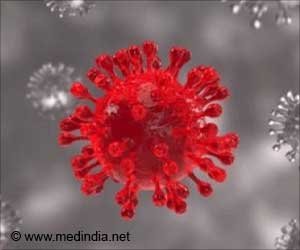COVID-19 Immunity Mitigates Recurrent Spread of Infection

This study was done by a team from the University of Geneva (UNIGE) and Geneva University Hospitals (HUG), after revisiting epidemiological data collected in Geneva.
Earlier, one in three people exposed to SARS-CoV2 was infected, and as many as two in five with the
. In the case of immunity conferred by vaccination, infection, or a combination of the two this rate drops to one in ten.
While protection following infection appears to be slightly greater than after vaccination albeit at the risk of potentially severe symptoms vaccination reduces the contagiousness of patients over a longer period.
Advertisement
As the number of cases rises again, air filtration, ventilation, and the wearing of masks in the vicinity of vulnerable people appear to be necessary measures. These results can be discovered in the journal Nature Communications.
”Our aim was to assess the secondary attack rate of SARS-CoV2, i.e. the proportion of infected people among the contacts of a sick person, to see the effect of immunity on transmission, and to identify how this effect is divided between reduced contagiousness and protection against infection”, explains Delphine Courvoisier, assistant professor in the Department of Medicine at the UNIGE Faculty of Medicine, epidemiologist at the HUG Healthcare Quality Department, and HUG delegate as Head of the data unit at the Cantonal Medical Service, who directed this work.
Analyzing a wide array of COVID-19 Data
Data on more than 50,000 cases and 110,000 contacts recorded in the Canton of Geneva between June 2020 and March 2022 were analyzed. These figures constitute a very comprehensive database, both in terms of the number of cases and the range of information provided: living area, age, weight, type of symptoms, vaccination status, dates of vaccination and/or infection.
”This study does not focus on biological samples, but on test results and the follow-up of contacts reported by people testing positive for COVID-19,” explains Denis Mongin, Research Fellow in the Department of Medicine at the UNIGE Faculty of Medicine, statistician at the HUG, and Delegated expert to data processing. ”However, the amount of data available to us means that we can carry out a detailed analysis and adjust the parameters to avoid any bias.”
Which Immunity is Effective? Immunity by Vaccination or Infection?
On average, a person infected just over three out of ten of their contacts, mainly within the family unit, and up to four out of ten with Omicron. However, immunity drastically reduces the number of infected contacts, mainly by protecting against infection, and to a lesser extent by reducing the infectivity of diseased individuals.
What’s more, these results confirm what had already been observed: immunity following infection has a stronger effect on transmission of the virus than the vaccine, both in terms of reducing contagiousness and the risk of contamination. However, the effect wears off within a few months in all cases.
”However, the risks associated with infection are significant, particularly for frail people. We also know that there are cumulative risks associated with multiple infections, particularly cardiac, or neurological risks,” says Delphine Courvoisier.
In addition, analysis of the Geneva data shows that age, sex, socio-economic status, and obesity have little impact. Nor did combining vaccination and infection confer greater immunity.
Recommended Precautions
For the time being, while vaccines are still useful in limiting contagiousness, particularly for carers and the very elderly and/or frail, they cannot be the only public health measure in the event of a new wave.
”This is why relatively simple and inexpensive public health measures such as air filtration, ventilation of homes, offices, and classrooms, and the wearing of masks should be considered if we want to effectively reduce the spread of SarS-Cov-2,” conclude the authors.
Reference :
- Effect of SARS-CoV-2 prior infection and mRNA vaccination on contagiousness and susceptibility to infection
– (https://www.nature.com/articles/s41467-023-41109-9)
Source: Eurekalert
Source link
#COVID19 #Immunity #Mitigates #Recurrent #Spread #Infection



